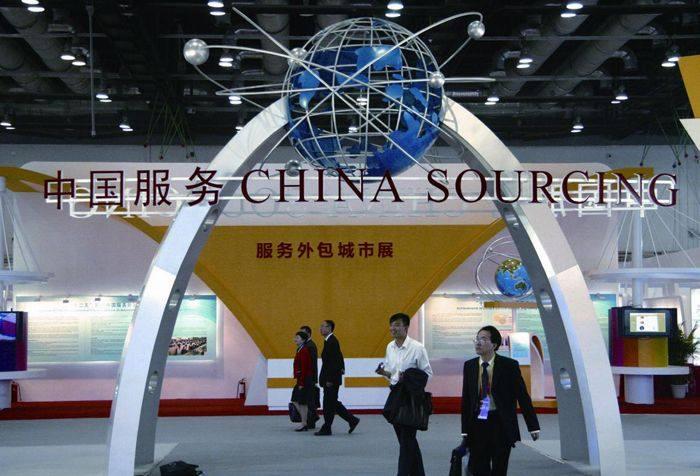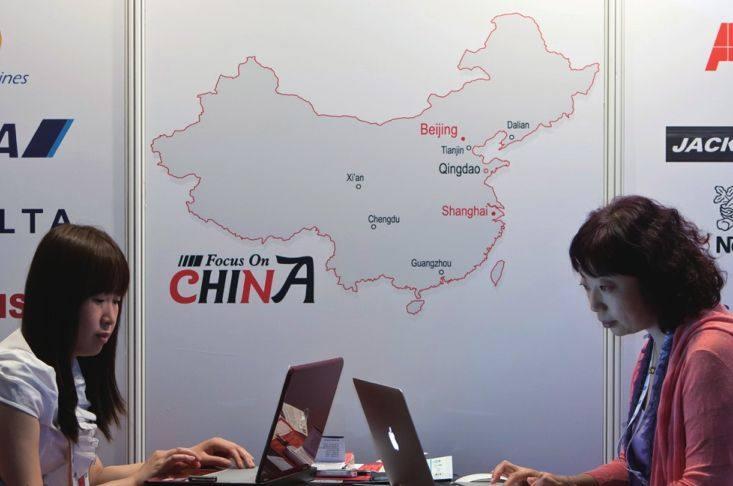Beijing Fair Promotes China’s service trade
By SUN LI


THE first China (Beijing) International Fair for Trade in Services (CIFTIS) was held at the China National Convention Center from May 28 to June 1, 2012. “Trade in Services: New Vision, New Opportunities and New Development” was the theme of the event.
CIFTIS is being touted as an important launch pad for Chinese firms to reorient their trade business toward higher-end services. Indeed, CIFTIS could be the next go-to acronym in trade circles at home and abroad, and could mark the biggest shift in Chinas pattern of trade since that other acronym, the WTO, came to China in 2001.
A New Trade Fair, Born from Demand
In recent years, Chinas trade in services has developed rapidly. A lot of growth has come from increasingly competitive emerging services such as IT services, insurance, finance and consultation, while traditional services, including tourism, transportation and construction, have held strong. Chinas overall trade volume in services is increasing rapidly, and Chinese services are recognized internationally as solid, competitive products.
In 1982, the total volume of Chinas foreign trade in all services stood at a mere US $4.4 billion. By 2011, this figure rose to US $419.1 billion. Chinas share in the global trade in services had climbed to five percent in 2010, from 0.6 percent in 1982. The period 2006-2011 in particular saw a sharp increase in the trade in emerging services, with volumes rising from US $31.34 billion to US $87.35 billion over the period – an average annual increase of 22.8 percent.
According to Lü Jijian, deputy director of the Trade in Services Department of the Ministry of Commerce, from 2007 to 2011, the ministry held three conferences on Chinas trade in services in Beijing and Shanghai to analyze development trends in the international trade in services and capitalize on those trends. During the period, China climbed to number three worldwide for service imports and number four for service exports.
CIFTIS is a natural successor to annual conferences held for the last three years to promote Chinas trade in services. CIFTIS aims to become a stage for China to promote its strength in services and achieve its 2015 target of total trade volume of US $600 billion – an average growth of 11 percent for 2011-2015. CIFTIS is to be an important conduit for Chinas service imports and exports, a channel for the authoritative release of information and policy on trade in services, as well as a negotiating space for businesses and traders.
CIFTIS is devoted to building a bridge for service enterprises in order to foster international exchanges and communications. The fair provides a dialogue platform for world participants to push forward cooperation and development in the services trade, and is on track to make solid contributions to exploiting Chinas new advantages in trade. The fairs organizers hope to see future recognition of the Canton Fair in the south as the nations largest event for commodity trade, and CIFTIS in the north as the equivalent for trade in services.
“A common meeting place for traders in services is needed in both China and the wider world. We need to deepen communication and cooperation among global players to take international trade in services to a higher level. The fair should also help deepen exchanges and cooperation among governments and aid the sharing of the latest global information and policies of different countries on trade in services,” Lü said.
An Authoritative World Platform for trade in services

CIFTIS was billed as an international fair featuring global traders sharing information and resources. The United Nations Conference on Trade and Development (UNCTAD) and the Organization for Economic Co-operation and Development (OECD) have been invited to be the permanent supporting organizations for the fair. Leaders from a number of developed countries and Chinas main trade partners in services were present at the inaugural ceremony and high-level forums.
Currently, the CIFTIS is the only comprehensive international fair for trade in services. It features all 12 sectors of the trade as defined by the WTO: transportation, education, distribution, communication, tourism and travel services, construction and engineering services, recreational, cultural and sporting services, health services, environmental services, financial (insurance and banking) services, business (including professional and computer) services and other services. The fair aims to appeal to both buyers and sellers of services alike.
CIFTIS, as an international hub, drew on the best parts of Western and Chinese fair management during its five-day run this year.
It featured six key programs: the opening ceremony, high-level forums, business talks, exhibitions, theme day activities and press conferences. The opening ceremony was attended by state leaders from around the world like Vice President of Kenya Kalonzo Stephen Musyoka, the U.K. Trade and Investment Minister Lord Green, and the Australian Minister for Trade Dr. Craig Emerson. Its high-level forums included one for China-Africa cooperation on trade in services and one for the Organization for Economic Cooperation and Development.
Business talks were at the core of the fair. Sponsors conducted business talks involving all 12 sectors of trade in services. Exhibitions provided a window for enterprises to showcase their products and achievements, and an important platform to attract potential cooperation partners. Exhibitions were divided into a national section for domestic provinces and municipalities, an overseas section, a Hong Kong, Macao and Taiwan section and an area set aside for international corporations. Theme day activities were dedicated to introducing various countries, domestic provinces and municipalities, as well as Chinas large-scale state-owned enterprises. The Ministry of Commerce and other ministries, international organizations and industry associations provided a steady flow of information to the press for the duration of the fair.
The organizers endeavored to shape the first CIFTIS into a pragmatic and efficient large-scale business event with deal-making at its core. They tried to ensure an equal mix of buyers and sellers at the fair and encourage them to meet in a variety of settings, allowing the best pos- sible chance for deals to be struck.
A New Landmark for Beijing

That CIFTIS was held in Beijing is testament to the special place Beijing occupies in Chinas rapidly developing trade in services. According to Cheng Yuhua, vice director of Beijing Municipal Commission of Commerce, Beijing currently leads China in services trade. In 2011, Beijings trade volume in services reached US $89.54 billion, taking up over 20 percent of the national total. Whats noteworthy is that 75 percent of Beijings GDP is derived from its service industries, much higher than the national average level of 43 percent. In addition, the proportion of emerging service sectors such as communication, insurance, finance and IT to Beijings total service trade volume rose to 40.36 percent in 2011, from 30 percent in 2003.
Beijing has also led China in service outsourcing in recent years. In 2011, the city completed offshore outsourcing contracts to a value of US $2.449 billion, representing a year-on-year increase of 59.3 percent. As of the end of 2011, of those enterprises in Beijing engaged in service offshore outsourcing, 53 saw their business volume surpass US $10 million, and four were selected as Chinas 2011 Top Ten Service Outsourcing Enterprises.
A number of businesses in Beijing are spearheading this service trade surge. For instance, the city now seats all of the Chinas three national bases for copyright trade, including the International Copyright Exchange. The China Beijing Equity Exchange is the largest of its kind in the nation.
Cheng indicated that the rapid development of Beijings trade in services had a lot to do with the citys status as national capital and its favorable trade policies and a can-do attitude. Beijings economic development owes a lot to the financial support of the central authorities, who have helped Beijing gain an economic foothold as a hub for many international enterprises.
The large number of foreign tourists who frequent the city lends impetus to its service industry. Favorable policies prescribed in the 11th Five-year Development Plan for Beijing Service Industries have also helped.
To maintain its leading national position in the services trade, Beijing has established an interdepartmental working group to promote the development of the sector. The citys vice mayor is in charge of this working group, which consists of 25 administrative departments and intermediary organizations.“On the whole, CIFTIS will promote the sound interaction between, and the coordinated development of, trade in services and the commodity trade in China. We notice from the history of some developed countries that service industries become an integral component of transformation in a countrys economy. As for CIFTIS, it will definitely go some way to improving the capitals and Chinas trade patterns. Its all part of the push toward a smarter economy, “ Cheng said.

